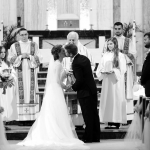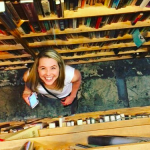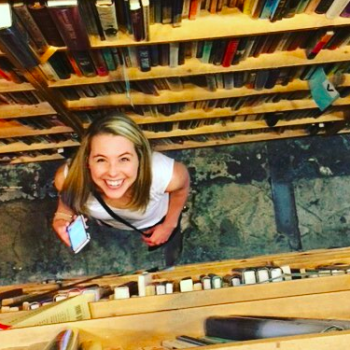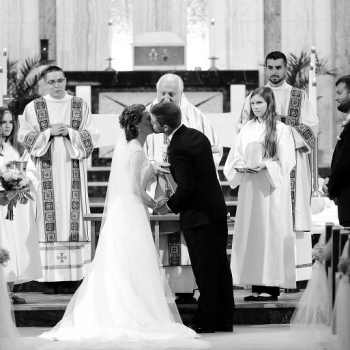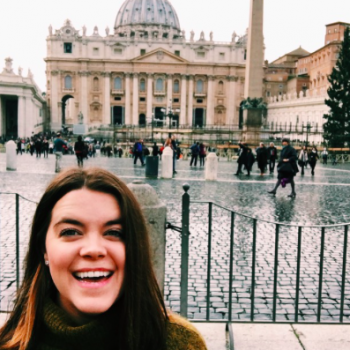Forgive me for the long (read: very, very long) hiatus I took smack dab in the center of this series. It was very Mary Kate-esque of me to start my first series and then take, like, a two month break after the first post. *sigh* His power is perfected in my weakness, y’all. Mea Culpa!
Anyway, so: in continuing this series, we come to the second most common response I had when I asked young adults in a recent survey what it was they were looking for from their church communities—and so, here we are: 25, Catholic, & Here For The Party.
IT’S COMMUNITY. Young adults are looking for community and fellowship from the church. It’s the reason that young adult events offering free beer, wine, and La Croix (as one survey respondent put it) are typically so successful—not because we’re all like, 25, Catholic, & Here For The Free Alcohol, but because the opportunity to gather around food or drink is the opportunity to gather. Period.
I’ve been thinking a lot recently, both within this context and elsewhere, about the call that each human person has to be a self-gift. In Pope Paul VI’s Gaudium Et Spes, we’re reminded that:
“Indeed, the Lord Jesus, when He prayed to the Father, “that all may be one. . . as we are one” (John 17:21-22) opened up vistas closed to human reason, for He implied a certain likeness between the union of the divine Persons, and the unity of God’s sons in truth and charity. This likeness reveals that man, who is the only creature on earth which God willed for itself, cannot fully find himself except through a sincere gift of himself.(2)”
JP II echoed this idea, when he said in Redemptor Hominis that “man cannot live without love. He remains a being that is incomprehensible for himself, his life is senseless, if love is not revealed to him, if he does not encounter love, if he does not experience it and make it his own, if he does not participate intimately in it.”
Man must create a gift of himself. We cannot so much as begin to understand ourselves if we do not have opportunities to love in our lives. So where can we find these opportunities?
One of these places, I believe, is in community.
I often think back to college and the emphasis placed on community that most of us likely experienced. College freshmen are encouraged to “get involved”—rush a fraternity or sorority, join a club sport, participate in Newman Center events, and for what? For community.
The Catechism is bursting with good material on this topic:
“The human person needs to live in society. Society is not for him an extraneous addition but a requirement of his nature. Through the exchange with others, mutual service and dialogue with his brethren, man develops his potential; he thus responds to his vocation.” (1879)
But here is where we must return to a post I wrote a few weeks months back: the choice of whom we enter into community with is so, so important.
C.S. Lewis delves into this in “The Four Loves” when he discussed the difference between companionship and friendship. You can read more about that here.
Gaudium Et Spes touches this topic within the context of both public and private life:
“Among those social ties which man needs for his development, some, like the family and political community, relate with greater immediacy to his innermost nature; others originate rather from his free decision. In our era, for various reasons, reciprocal ties and mutual dependencies increase day by day and give rise to a variety of associations and organizations, both public and private. This development, which is called socialization, while certainly not without its dangers, brings with it many advantages with respect to consolidating and increasing the qualities of the human person, and safeguarding his rights.(4)
But if by this social life the human person is greatly aided in responding to his destiny, even in its religious dimensions, it cannot be denied that men are often diverted from doing good and spurred toward and by the social circumstances in which they live and are immersed from their birth. To be sure the disturbances which so frequently occur in the social order result in part from the natural tensions of economic, political, and social forms. But at a deeper level they flow from man’s pride and selfishness, which contaminate even the social sphere. When the structure of affairs is flawed by the consequences of sin, man, already born with a bent toward evil, finds there new inducements to sin, which cannot be overcome without strenuous efforts and the assistance of grace.”
Obviously we see the undertones of public life at play here, but the emphasis on the impact that community can have and the notion of communities originated from free decision are just as important.
If the social environments we’re born into can impact us this much, the ones we choose for ourselves are that much more critical.
And young adult Catholics know this. What’s more, we know ourselves and our faith, and we deeply desire a community that not only welcomes this, but embraces and contributes to it. And we deeply desire to give ourselves back to a community that gives us what we’re looking for.
It is, like so many other things, part of the human condition.
And it’s why we seek it in the Church.

